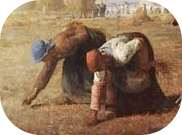
This Page Title – Gleanings in the Psalms – Psalm 41
The Wicket Gate Magazine "A Continuing Witness".
Internet Edition number 81 – placed on line November 2009
Magazine web address – www.wicketgate.co.uk

Verse 1 “Blessed is he that considereth the poor …” This is the third psalm to begin with the word “blessed.#8221;> In Psalm 1, that man is pronounced “blessed” who “delights in the law of the Lord” and who “meditates” in that law “day and night”. Rightly so! The Word of God alone shows us what we are by nature and what God makes of us by grace. The knowledge of sins forgiven is by the Word of God and that second blessedness is pronounced in Psalm 32: “Blessed is he whose transgression is forgiven, whose sin is covered.” And now, the third source of blessedness is contained in the use of his life that the forgiven sinner makes to the good of others and the glory of Christ: “Blessed is he that considereth the poor …“ In all things: “Freely ye have received, freely given;” “Blessed are the merciful, for they shall obtain mercy.” That is no gospel at all which does not set before us the absolute moral demands of God.
Verse 3 “… Thou wilt make all his bed in his sickness.” When a good man is ill at ease in a time of sickness, God promises to “make all his bed.” Pillow, bolster, head, feet, sides – all his bed. Surely that God who made the man knows so well his measure as to make his bed to please him. When Jacob slept on the ground, who would not have had his hard lodgings, therewithal to have his heavenly dream?
Thomas Fuller
Verse 3 “– Thou wilt make all his bed –” When I visited one day, as he was dying my beloved friend Benjamin Parsons, I said, “How are you today, Sir?” He said, “My head is resting very sweetly on three pillows – Infinite Power, Infinite Love, and Infinite Wisdom.”
Paxton Hood, in "Dark Sayings on a Harp," 1865
Verse 4 “… Heal my soul, for I have sinned against thee.” What saith David from the very bottom of his heart in his time of sickness? Not, take away this death only. No! Do not take this sickness and death only away; but take this sin away that hath dishonoured thee and hath separated between me and thee. “Heal my soul, for I have sinned against thee.”
Thomas Goodwin
Verse 4 “… For I have sinned against thee.” Saul and Judas each said, “I have sinned;” but David says, “I have sinned against thee.”
Verses 7 and 8 “All that hate me whisper together against me – an evil disease, say they, cleaveth fast unto him: and now that he lieth down shall rise up no more.” When the Lord smites his people with his rod of affliction for a small moment, their enemies expect to see them capitally executed, and prepare their jubilates to celebrate their funerals. But they are in too great a hurry, and have to alter their ditties and sing to another tune.
C. H. Spurgeon
Verse 9 “Yea, mine own familiar friend – hath lifted up his heel against me.” The sufferings of the Church, like those of her Redeemer, generally begin at home. Her open enemies can do her no harm, until her pretended friends have delivered her into their hands. And, unnatural as it may seem, they who have waxed fat upon her bounty, are sometimes first to “lift up the heel” against her.
Geo. Horne
Verses 11 and 12 “By this I know that thou favourest me, because mine enemy doth not triumph over me. And as for me, thou upholdest me in mine integrity …” In this text we see two things. (1) How David assured himself of God's love towards him. (2) How thankful he is to God for assuring him of His love. The first he does by two arguments: one is taken from his enemies, they were prevented in their expectation – “Therefore thou lovest me.” The other is taken from his own estate, which was not one whit hurt or impaired but bettered by them “Therefore thou lovest me.” Mary and Martha put Christ in mid of but two things; and the first was that Christ loved their brother Lazarus; the second was that Lazarus was sick. “He whom thou lovest is sick.” There was no need to tell Him what He should do, for they knew that He would do all that was needing done for Lazarus, because He loved him.
William Burton
Verse 12 “And as for me, thou upholdest me in mine integrity, and settest me before thy face for ever.” This text reveals the insignia of those whom grace has distinguished. (1) Their integrity is manifest – “thou upholdest me in mine integrity.” (2) Their character is divinely sustained – “thou upholdest me in mine integrity.” (3) They dwell in the favour of God – “and settest me before thy face.” (4) Their eternal future is secure – “and settest me before thy face for ever.”
Hints to the Village Preacher

This Page Title – Gleanings in the Psalms – Psalm 41 The Wicket Gate Magazine "A Continuing Witness". Internet Edition number 81 – placed on line November 2009 Magazine web address – www.wicketgate.co.uk |